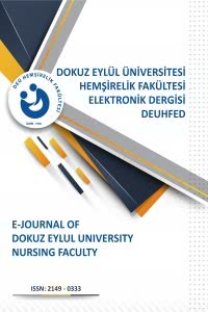Kanser Hastalarında Konstipasyon Sıklığı ve Gelişme Riskinin İncelenmesi
Onkoloji, Konstipasyon, Hemşirelik
Investigation of Constipation Frequency and Development Risk in Cancer Patients
Oncology, Constipation, Nursing,
___
- 1. Wickham RJ. Managing constipation in adults with cancer. J Adv Pract Oncol 2017;8(2):149-61.
- 2. Gonzales LK, Delmastro MA, Boyd DM, Sterling ML, Aube PA, Le RN, et al. Adjusting bowel regimens when prescribing opioids in women receiving palliative care in the acute care setting. Am J Hosp Palliat Care 2016;33(7):663-8.
- 3. McIlfatrick S, Muldrew DHL, Beck E, Carduff E, Clarke M, Finucane A, et al. Examining constipation assessment and management of patients with advanced cancer receiving specialist palliative care: a multi-site retrospective case note review of clinical practice. BMC Palliat Care 2019;18(1):57. 4. Sayın Kasar K, Yıldırım Y. Konstipasyon. İçinde: Yıldırım Y, Fadıloğlu Ç, Palyatif Bakım Semptom Yönetimi ve Yaşam Sonu Bakım. Ankara: Nobel Tıp Kitabevleri; 2017: 533-548.
- 5. Lam WC, Zhong L, Liu Y, Shi N, Ng B, Ziea E et al. Hong Kong Chinese medicine clinical practice guideline for cancer palliative care: pain, constipation, and insomnia. Evid Based Complement Alternat Med 2019; 1-14.
- 6. Zhe H. The assesment and management of constipation among patients with advanced cancer in a palliative care ward in china: a best practice implementation project. JBI Database of System Rev Implement Rep 2016;14(5):295-309.
- 7. Bengi G, Yalçın M, Akpınar H. Kronik konstipasyona güncel yaklaşım. Güncel Gastroenteroloji 2014;18(1):72-88.
- 8. Uysal N, Şenel G, Karaca Ş, Kadıoğulları N, Koçak N, Oğuz G. Palyatif bakım kliniğinde yatan hastalarda görülen semptomlar ve palyatif bakımın semptom kontrolüne etkisi. Klinik çalışma. Ağrı Dergisi 2015; 27(2):104-10.
- 9. Karadakovan A. Yaşlı Sağlığı ve Bakım. Ankara: Akademisyen Tıp Kitabevi; 2014: 279-95.
- 10. Sendir M, Büyükyilmaz F, Asti T, Gürpınar S. Postoperative constipation risk assessment in Turkish orthopedic patients. Gastroenterol Nurs 2012; 35(2):106-13. 11. Cochran WG. Sampling techniques. New York: John Wiley & Sons; 1977: 1-448. ISBN: 978-0-471-16240-7.
- 12. Lindberg G, Hamid SS, Malfertheiner P, Thomsen OO, Fernandez LB, Garisch J et al. World Gastroenterology Organisation global guideline: constipation—a global perspective. J Clin Gastroenterol 2011;45(6):483-487.
- 13. Richmond JP, Wright ME. Review of the literature on constipation to enable development of a constipation risk assessment scale. Clin Eff Nurs 2004;9(1-2):37–48.
- 14. Kutlu Koca A, Yılmaz E, Çeçen D, Eser E. The reliability and validity of the turkish version of the constipation risk assessment scale. Gastroenterol Nurs 2010;34(3):200-8.
- 15. Hagmann C, Cramer A, Kestenbaum A, Durazo C, Downey A, Russel M et al. Evidence-based palliative care approaches to non-pain physical symptom management in cancer patients. Semin Oncol Nurs 2018;34(3):227-40.
- 16. Arthur J, Hui D. Safe opioid use: management of opioid-related adverse effects and aberrant behaviors. Hematol Oncol Clin North Am 2018;32(3):387-403.
- 17. Veiga DR, Mendonça L, Sampaio R, Lopes JC, Azevedo LF. Incidence and health related quality of life of opioid-ınduced constipation in chronic noncancer pain patients: a prospective multicentre cohort study. Pain ResTreat 2018; 2018:5704627.
- 18. Larkin PJ, Cherny NI, La Carpia D, Guglielmo M, Ostgathe C, Scotte F et al. ESMO Guidelines Committee. Diagnosis, assessment and management of constipation in advanced cancer: ESMO Clinical Practice Guidelines. Ann Oncol 2018; 29(4):111-25.
- 19. Dzierżanowski T, Ciałkowska-Rysz A. The occurrence and risk factors of constipation in inpatient palliative care unit patients vs. nursing home residents. Prz Gastroenterol 2018; 13(4): 299-304.
- 20. Boland JW, Elaine G. Pharmacological therapies for opioid induced constipation in adults with cancer. Bmj 2017; 358: j3313.
- 21. Abramowıtz L, Beziaud N, Labreze L, Giardina V, Causse C, Chuberre B et al. Prevalence and impact of constipation and bowel dysfunction induced by strong opioids: a cross-sectional survey of 520 patients with cancer pain: Dyonısos study. J Med Econ 2013; 16.12: 1423-1433.
- 22. Younes WO, Tawalbeh LI. Bowel management: constipation among patients with cancer. J Palliat Care Med 2017;(7)4.
- 23. Locasale RJ, Datto CJ, Margolis MK, Tack J, Coyne KS. The impact of opioid‐induced constipation among chronic pain patients with sufficient laxative use. Int J Clin Pract 2015; 69.12: 1448-1456.
- 24. Wang PM, Hsu CW, Liu CT, Lai TY, Tzeng FL, Huang CF. Effect of acupressure on constipation in patients with advanced cancer. Support Care Cancer 2019; 1-6.
- 25. Celik S, Atar NY, Ozturk N, Mendes G, Kuytak F, Bakar E et al. Constipation risk in patients undergoing abdominal surgery. Iran Red Crescent Med J 2015;17(6).
- 26. Lavan AH, O'Mahony D, Buckley M, O'Mahony D, Gallagher P. Adverse drug reactions in an oncological population: prevalence, predictability, and preventability. Oncologist 2019; 24(9): e968.
- 27. Dzierżanowski T, Ciałkowska-Rysz A. Behavioral risk factors of constipation in palliative care patients. Supportive Care Cancer 2015; 1787-1793.
- 28. Wickham RJ. Assessment of constipation in patients with cancer. J Adv Pract Oncol 2016;7(4):457–62.
- 29. İlaslan E, Özer Z, Kol E. Kolorektal kanserlerde palyatif bakım hemşireliği. JAREN/ Hemşirelik Akademik Araştırma Dergisi 2017;3(1):43-8.
- ISSN: 2149-0333
- Yayın Aralığı: Yılda 4 Sayı
- Başlangıç: 2008
- Yayıncı: Dokuz Eylül Üniversitesi Hemşirelik Fakültesi
Figen Şengün İNAN, NESLİHAN GÜNÜŞEN, Sevecen ÇELİK İNCE, Zekiye ÇETİNKAYA DUMAN
Üniversite Öğrencilerinin Gelecekte Çocuk Sahibi Olmaya İlişkin Düşünceleri ve Etkileyen Faktörler
Tülay KUZLU AYYILDIZ, Hülya KULAKÇI ALTINTAŞ, Cansu AYDIN, Esra MİNAZ, Tuğba YÖRÜK
Periferik İntravenöz Katetere Bağlı Flebit Oranının ve Etkileyen Faktörlerin Değerlendirilmesi
Soner BERSE, Betül TOSUN, Nuran TOSUN
Riskli Gebelerde Yaşanan Anksiyete, Prenatal Bağlanma ve Hemşirenin Rolü
Kronik Ruhsal Hastalığı Olan Bireylerde Diyabet Yönetimi ve Psikiyatri Hemşiresinin Rolü
Sevecen ÇELİK İNCE, NESLİHAN GÜNÜŞEN
McCloskey ve Mueller’in İş Doyum Ölçeği’nin Türkçeye Uyarlanması: Geçerlik ve Güvenirlik Çalışması
Ailenin Güçlendirilmesi ve Pediatri Hemşireliğinde Uygulanması
Pelin KARATAŞ, Hüsniye ÇALIŞIR, Seher SARIKAYA KARABUDAK
Üniversite Öğrencilerinin Üriner İnkontinans Farkındalıkları ve Benlik Saygıları Arasındaki İlişki
Özge ÖZ YILDIRIM, Dilek ÇELİK EREN, MEHMET KORKMAZ, İlknur AYDIN AVCİ
Kemoterapi ve Radyoterapi Alan Hastalarda Oral Mukozit: Bir Gözden Geçirme
